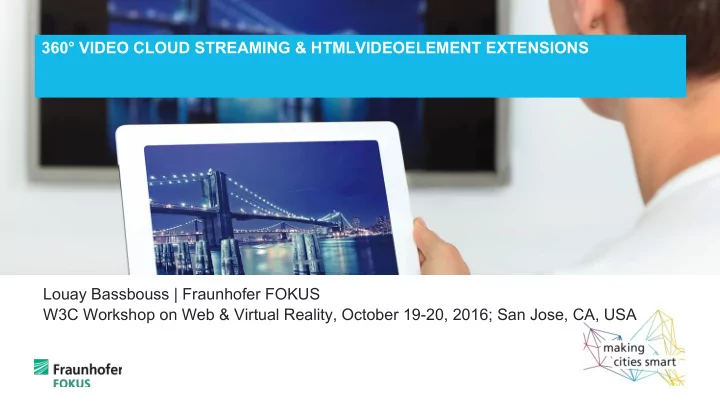

360° VIDEO CLOUD STREAMING & HTMLVIDEOELEMENT EXTENSIONS Louay Bassbouss | Fraunhofer FOKUS W3C Workshop on Web & Virtual Reality, October 19-20, 2016; San Jose, CA, USA September 2016
360° video cloud streaming https://www.fokus.fraunhofer.de/go/360 2 W3C Workshop on Web & Virtual Reality September 2016
360° STREAMING AND VIDEO PROCESSING OPTIONS Option1 Option2 Option3a user input 360° Processing 360° Pre- Processing Server ... user input Prepare Video Streaming Streaming Streaming user input 360° Processing Client Video Playback Video Playback Video Playback 3 W3C Workshop on Web & Virtual Reality September 2016
360° STREAMING AND VIDEO PROCESSING OPTIONS Option1 Option2 Option3b user input 360° Processing 360° Pre- Processing Server ... Streaming Streaming Streaming user input 360° Processing user input Prepare Stream Client Video Playback Video Playback Video Playback 4 W3C Workshop on Web & Virtual Reality September 2016
ADVANTAGES AND DISADVANTAGES Option1 Option2 Option3a Option3b Additional Storage No No Yes Yes 360° Video Yes No No No Processing on Client No 1 No 1 360° Video No Yes Processing on Server Low 2 Bandwidth High Low Low Medium 3 Medium 3 Medium 4 Motion-to-Photon Low Delay No 5 No 5 CDN usage Yes Yes Example Target Head Mounted Low Capability Low Capability Medium Capability Devices Displays Devices e.g. HbbTV Devices e.g. HbbTV Devices e.g. Chromecast Interaction Types - Motion Sensors - TV RC - TV RC - TV RC - Touch/Mouse - Keyboard - Keyboard - Keyboard - (Touch/Mouse) - (Touch/Mouse) - Touch/Mouse 5 W3C Workshop on Web & Virtual Reality September 2016
Notes for previous slide 1) The original 360° video will be pre-processed and FOVs are stored in separate files. There will be an overlap between the FOVs this is why there is a need for more storage but on the other side no video processing is needed. 2) since only one FOV is streamed to the client, no additional bandwidth is needed comparing to traditional video streaming. But it is still possible to pre-cache neighboring FOVs e.g. in lower quality to enable fast switch between FOVs in this case additional bandwidth is needed 3) Motion to Photon delay depends on network latency and protocol used to stream a single FOV (and Buffering on the Player). 4) Motion to Photon Delay depends on the caching strategy of the player. 5) it is difficult to use CDN since a persistent connection between client and server is needed (there is a session for each client) 6 W3C Workshop on Web & Virtual Reality September 2016
DEMONSTRATION (Option 3b) ... ... 360° Pre- Processing 4k origin 360° Video, 30fps, bitrate 40053 kb/s HD view port, 30fps, bitrate 2435 kb/s, segment=333ms X • HTML5 Video Element (MSE) • Intelligent/Efficient Buffering (two dimensions: time and space) Prepare Stream 60° (Caching) • No Canvas, WebGL or any other APIs are required 7 106.7° W3C Workshop on Web & Virtual Reality September 2016
Demo video 8 September 2016
HTMLVIDEOELEMENT EXTENSIONS − Two types of players: − Native 360° Video Player − Using MSE → do we need extensions for the MSE API? − Native 360° Video Player: − The HTMLVideoElement plays 360° video natively. Set video.src={360_video_url} (or use <source element>) − The HTMLVideoElement needs to get all the metadata in order to render the view correctly. − New functions to set and get the FOV are needed − New events on start, during and after changing the FOV are needed − (Maybe also functions and events for Zoom in/out.) − Example: ● video.setFOV(phi, theta, width, height) ● video.onfovstart, video.onfovend, ... 9 W3C Workshop on Web & Virtual Reality September 2016
HTMLVIDEOELEMENT EXTENSIONS − MSE 360° Player − Allows to implement different player algorithms similar for DASH on top of MSE − Available viewports can be described in a manifest (e.g. DASH SRD fields) − At the start of the playback the currently selected viewport is buffered. When the user triggers a switch request for a different viewport, already buffered segments are removed/replaced by segments of the new viewport. − Challenge: ● How to reduce delay by switching between two viewports? 10 W3C Workshop on Web & Virtual Reality September 2016
Recommend
More recommend